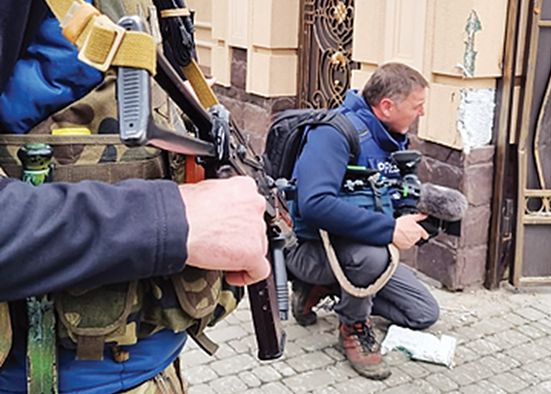'The dirtiest war we have covered'
'The dirtiest war we have covered'
20 April 2022

A TV cameraman from Downpatrick has branded the Russian invasion of Ukraine the “dirtiest” war he has covered in his long career.
Eugene Campbell has spent the last month witnessing the horrors of battle for ITN.
Together with his colleague, news correspondent Dan Rivers, Eugene broadcast a distressing report last week showing the deaths of soldiers and many civilians in a number of cities.
The horrors of what happened was revealed after the Russian military withdrew when its attempt to size the capital Kyiv failed.
The report showed how Russian soldiers left the bodies of civilians killed in a mass grave and how the desperate family members wanted the journalists to tell their stories to the world.
One man was seen recognising his brother being taken away in a body bag for identification and a war crimes investigation.
Eugene has won many awards for his coverage of conflicts all over the world.
He missed death by inches during a gun battle in Afghanistan in 2006 when he was an embedded cameraman with the Parachute Regiment.
But the savagery of what he has seen in Ukraine has left its mark on him.
“It’s not like in the movies, when you walk through a war scene, trying your best not to work on a landmine, looking for a trip wire and in the case of Bucha, not walking on body parts, everything is burnt,” Eugene told the Recorder.
“This is the dirtiest war I have ever covered as the attacks are so indiscriminate. Particularly with the type of weaponry that is being used. When it blows up, the sharpnel is designed with the sole intention of cutting through flesh.”
He told how his ITN team were taken to a cellar to witness the murders of five men who were shot.
“These men were taken to this cellar and had their hands bound behind their backs with the sole intention of executing them,” said Eugene.
“These was no some kind of casulty of war but premediated murder.”
He said that so far he has not seen any atrocities carried out by Ukrainians but adds: “It appears to have been mostly caused by the Russians but finding what is the truth in war is so difficult and may not be known for years to come.”
He feels that it is important to record and document what happens in any war, not just for news but for history as well.
He has been based in a hotel in Kyiv and hopes to travel home to London where he has lived since moving since moving to ITN.
Eugene was raised in Quoile Park and attended De La Salle High School.
His parents, Sean and Ann, have sadly passed away and while there is no family home in Downpatrick anymore, his brothers and sisters live not too far away.
He got his first break in broadcasting when he started work as a ‘gofer’ at the age of 17 but later was trained as a camera operator, working throughout Northern Ireland during the Troubles.
He said that while he worked for ITN for many years, he was asked to return to frontline-reporting as a freelance cameraman.
“I suppose I was really in semi retirement when I was asked to go to Ukraine and I think it down to the fact that I have covered so many conflicts, can speak some Russian and would know what to expect,” he explained.
“I was surprised how quickly the skills of covering a conflict came back. I found that going to Ukraine was a bit like learning to ride the war bike again for me.
“You learn from doing it for so long. And we’re been trained in the use of specialist first aid and trauma equipment we have with us in case we get a leg blown off or something like that.”
Eugene and his correspondents heed the advice of the security consultants who work with them, knowing that the Russians have targeted journalists before.
After spending some time living and working in Russia, Eugene has some compassion for the heavy casualties that Russian president Vladimir Putin’s army has suffered.
“It’s like how it always is in war. The political leaders decide to go to war and then it’s up to the military leaders to decide on how to achieve the objectives,”he says.
“There will be soldiers where the families will never get their bodies home again, even if they are able to find them. There was nothing left of soldiers who were killed in tank battles for instance. No one from their families will ever know what happened to them.”


